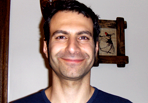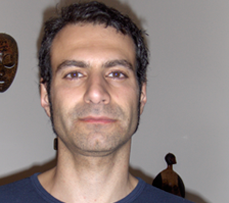Participez à la conversation!
... et contribuez à la valorisation de la MF
« I wanted to be able to take care of people throughout their life cycle, from prematurity all the way to post-mortem, to see how we really fit into this world. »
Family Medecine: An Interview with Dr. Zigby, Palliative Care Specialist

I first met Dr. Jean Zigby while doing an elective in hospitalist medicine. Before long, I became captured by his contagious exuberance, sagacious insights, and genuine passion for palliative care. As we sit in his office in the Radiation Oncology Department of the Jewish General Hospital, he shares about his unique outlook on medicine, his versatile practice, and the wonders and challenges of palliative care.
LM: Why did you choose family medicine as a career?
JZ: I got into family medicine because I found that I really enjoyed all the different branches of medicine and it was the only field that allowed me to become as wide-scoped as I wanted to be in my practice. I wanted to be able to take care of people throughout their life cycle, from prematurity all the way to post-mortem, to see how we really fit into this world. Medicine is really part of my philosophy of living and discovering what I think humans are doing on this earth, and family medicine is one of the most holistic ways of doing that.
LM: What is your practice like at the present?
JZ: My practice is approximately half-time family medicine at the CLSC Côte-des-Neiges, where I work at a family medicine group seeing patients by appointment and drop-in, as well as teaching residents and medical students. I also do about half-time specialty palliative care work at the Jewish General Hospital, on the Palliative Care Ward and as a consultant, as well as homecare for patients who wish to die at home. That is what my practice looks like on a weekly basis. Interspersed with that are regular stints up north for about a week at a time in Chisasibi, and irregular overnight shifts in the Neonatal Intensive Care Unit. I was also doing obstetrics for about 7 years, but with the coming of my children, I had slowed down the obstetrical side, but would like to increase it as they grow older.
LM: That is the beauty of family medicine. You can tailor your practice as life evolves!
JZ: Absolutely. Family medicine is probably the most flexible field to pursue. You’ll discover, as you go on, particular needs in your community which you would like to be addressed. Family medicine is one of the best ways that will allow you to participate and address those issues.
LM: What is the need like then in palliative care?
JZ: Palliative care is a subspecialty which was developed because of the perception that individuals at the end of their lives tend to get some of the worst quality care from physicians. It was born less out of a focus on a particular physiological system but more out of a human experience. It borrows from all of the different specialties, takes the best from them, and combines them into a patient-focused, experiential specialty. It looks at: what does your patient need in order to feel healed at the end of their lives? What does the patient’s family need in order to feel healed at the end of their loved one’s life? How do they integrate death into the continuation of their lives? We have boxed death into a very small portion of our culture, and we are paying a little price for it with increased fear and anxieties. This, however, gives us an opportunity to develop a more holistic way of integrating death and dying into our daily lives.
LM: How did you get into palliative care?
JZ: I got into palliative care the same way that many doctors did. It was by hearing Dr. Balfour Mount speaking to our medical class. He was one of the most inspiring individuals who walked into our class, the first one that questioned what we were doing in the room and what were our goals in medicine. He asked us to deeply question the way we practiced and really look at the people who were dying around us and not ignore them. It really addressed my interest in going into medicine, which was to experience all the different aspects of human life, and it challenged me to step up to the plate and do something about it. He brought in poetry, philosophy, art, music into his presentation – a total multimedia affair. It was actually quite a great example of medical propaganda (laughs).
LM: What kind of training is available for pursuing palliative care as a career?
JZ: There is a fellowship in palliative care, and I participated in that here at McGill. It is a very good and useful fellowship. You get a variety of experiences from home, hospital, and outpatient care, to oncologic and pediatric palliative care. You can do this fellowship anytime after completing a residency in any specialty, including family medicine.
LM: For students considering palliative care, what do you think are the most important attributes that they need to cultivate?
JZ: I think the most important attribute is self-reflection. It is very important to go into palliative care with an open mind to explore what death means to you. You have to be someone who is willing to take the time to understand individuals’ experiences. Therefore, you need to be both empathetic and patient with your own empathy.
You should also be honest, humble and critical of therapy. Palliative care is one of the most modest specialties because it is not interested in seeing any particular therapeutic modality win over another. If the end result is achieved better through a particular psychotherapeutic or even placebo effect, then perhaps that is what is necessary in the instance. Though we aspire to understand and utilize all the different technologies which help individual patients become more comfortable at the end of their lives, we are very humble at our limitations and listen clearly to what our patients tell us about the therapies. Every time you walk into the room, it is an experiment and you have to listen to the results. You need to have a scientist spirit to practice palliative care.
If you really enjoy testing how well you can appreciate somebody else’s experience, how well you can reflect on your own mortality as well as other patients’, and if you like to use multimodal approach in medicine, then palliative care is a fantastic specialty.
LM: What would you say are the challenges in this field?
JZ: The challenges are probably the same ones as the strengths. The biggest challenge is that there is a very strong need right now for palliative care. Some people believe that everybody should have a palliative care specialist at the end of their lives. It is not feasible yet. We are trying to offer quality care and not just quantity care. Most people mention the challenge of dealing with death on a daily basis. I would argue that most physicians are dealing with death on a daily basis, but they do not necessarily decide to face it. In palliative care, you are challenged to admit that you are dealing with death on a daily basis, and you have to develop approaches to face that fact. I consider this to be the attraction of palliative care, which is the honesty of where we are on earth, what the flow of our lives leads to, and why.
Interview conducted by Lei Ma
Si les soins palliatifs vous intéressent, il est possible de faire une 3e année après la résidence en médecine familiale pour se spécialiser dans le domaine. Cette surspécialité n’est habituellement pas nécessaire pour pratiquer les soins palliatifs.
R3 en soins palliatifs, Université Laval
R3 en soins palliatifs, Université de Montréal
Microprogramme en soins palliatifs et fin de vie, Université Sherbrooke
Palliative Care Residency Accredited one-year program of added competency, McGill University
Dans ce numéro
- À propos de nous
- Éditorial
- Espace FMOQ
- Espace CQMF
- Espace FMRQ
- Les variétés de pratique
Recherche
Médecine du travail
Missions humanitaires
Santé publique
Soins palliatifs (en anglais) - Stage coup de coeurManiwaki
- Congrès annuel sur la MF Apprendre au soleil
- 4 UMF en vedette
Côte-des-Neiges
des Etchemins
La Sarre
Moncton - Médecin de famille vedette
- Étudiant vedette
- Chronique livres
- CaRMS
- GIMF
- Chronique techno
- Santé mentale
Recherche

Ce qui me passionne dans la recherche en soins primaires c’est le défi de cibler des questions pratiques et d’y apporter des réponses pratiques tout en restant centré sur le patient. Afin de vous communiquer ma passion, je veux souligner à quel point le contexte de la médecine familiale est propice à la recherche et la place capitale de la recherche en soins primaires dans l’amélioration de la pratique. En effet, les médecins de famille constituent non seulement le premier point de contact avec le système de santé pour la majorité de la population mais aussi développent une relation permanente avec leurs patients. +
Variétés de pratique
Chaque numéro de Première ligne vous fait découvrir deux pratiques de la médecine familiale. Accédez aux modes de pratiques présentés dans les numéros précédents :
Novembre 2011
Le Groupe d'intervention médicale tactique
La pédiatrie
Septembre 2011
L'urgence
Le bureau
Mai 2011
Les soins intensifs
L'obstétrique
Dr. Jean Zigby

« You’ll discover, as you go on, particular needs in your community which you would like to be addressed. Family medicine is one of the best ways that will allow you to participate and address those issues. »